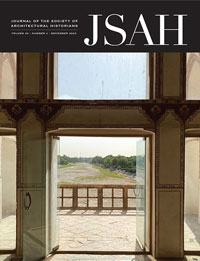May 4, 2022
by
Alexandra Klein, NHA Communications and Government Relations Manager
This Quarterly Column by the National Humanities Alliance offers a review of their FY 22 appropriations and advocacy efforts over the past year, as well as an update on where NHA is at as the FY 23 appropriations process kicks off.
In early March, five months after Fiscal Year 2022 began, Congress finally passed a funding package for the year. The package included significant increases for federal humanities programs—most significantly, the largest increase we’ve seen in a decade for the National Endowment for the Humanities.
This success followed a full year of robust humanities advocacy, much of which was supported by scholarly societies such as the Society of Architectural Historians. For example, thanks to their ability to mobilize their members, we were able to recruit advocates from all 50 states to participate in our 2021 Humanities Advocacy Day, which kicked off our advocacy for these FY 22 wins.
In addition to many other engagements with members of Congress and their staff throughout the year, we followed Humanities Advocacy Day with two congressional briefings to highlight the impact of NEH funding.
The first briefing, held in September 2021, discussed NEH funding for diverse histories and civics in K–12 education. Since 2018, NHA has worked with over 20 NEH-funded professional development programs for K-12 educators to survey their impacts, and this briefing was an opportunity for congressional staff to hear about the data we’ve collected. At the briefing, we shared that 100 percent of respondents to a post-program survey reported experiencing professional growth as a result of the program they attended and 98 percent of respondents said they would recommend participating in an NEH workshop to a colleague. Staffers also heard directly from project directors about how these programs—which covered a range of topics including Native American histories, the Mississippi Delta, the Transcontinental Railroad, and Japanese American internment—offer crucial professional development to our nation’s educators, illuminate diverse histories, and support civic education in our nation’s classrooms.
The second briefing, held in November 2021, showcased how NEH funding for public humanities discussions enriches our communities by highlighting the example of the NEH-funded “Freedom Stories: Unearthing the Black Heritage of Appalachia the International Storytelling Center (ISC) in Jonesborough, Tennessee. Those involved in the project spoke about how it built space for dialogue and learning, and about how the discussions offered participants the chance to explore our rich histories and come together across differences. Thanks to a partnership with NHA to document the impact of the program, we were able to highlight that 82 percent of participants in the “Freedom Stories” program agreed that they “feel more confident taking part in thoughtful discussions about race” as a result of the program, and 93 percent felt motivated to “listen to the stories of people whose backgrounds are different from [their] own.”
After a long year of advocacy and several continuing resolutions that kept government funding at FY 21 levels past the beginning of FY 22, we were particularly pleased to see Congress approve a $12.5 million funding increase for the NEH in March, bringing its FY 22 budget to $180 million.
Our other priorities also saw increases. These included an increase of $2.5 million for Title VI, which brought its funding to $71.9 million, and an increase of $1 million for Fulbright-Hays, which brought its funding to $9.8 million. The Institute of Museum and Library Services received $268 million, an $11 million increase for the agency overall. While there was an increase for both the Office of Museum Services and the administration budget, the funding to carry out the Library Services and Technology Act remained level. The National Archives and Records Administration received $388 million, an $11 million increase. And NHPRC received $7 million, a half a million dollar increase.
There was one disappointment that came with these numbers. Nearly across the board, these final numbers were significantly lower than the numbers that the House and Senate originally proposed for our priorities. This was, however, the case for nearly all domestic spending.
As we turn our attention to FY 2023, we are hopeful we can build on the level of support we saw in the initial FY 2022 bills to secure additional increases in the coming year. The FY 23 process is off to a good start with the administration proposing another round of robust increases for several humanities priorities, which we will be working to make a reality as Congress drafts its yearly appropriations bills.


